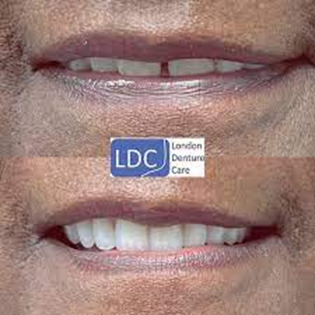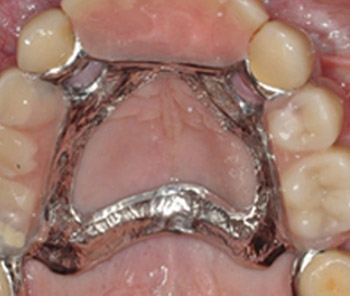Dentures are removable prosthetic appliances that are mainly hand crafted by a laboratory Dental Technician using the information, instructions and impressions supplied by the Clinical Dental Technician or a Dentist.
Dentures can be used to replace a missing tooth or several missing teeth and often when a patient has lost all their natural teeth. Partial dentures are used to replace one or more missing teeth. Complete dentures are used when a patient has lost all their natural tee
Going without the missing teeth can have several effects on an individual, below are the main reasons: -

Over Eruption and Migration of remaining Teeth: - If the missing teeth are not replaced, in many cases the adjacent teeth can move and the teeth in the opposing arch may over-erupt which may be a hindrance and has several implications. For example: - It complicates when manufacturing a removable or Fixed restoration.
Non-Invasive option: - Dentures are non-invasive option i.e. It doesn’t require any surgical or drilling into the natural teeth. However, depending on the case and the examination any teeth with poor prognosis or extreme mobility may need to be extracted before the fabrication of the Dentures.
Quick Turnaround: - With our On-site Dental Laboratory, Dentures can be made very quickly. From time to time we offer same day service for Acrylic Dentures, for us to provide this service, a patient must be flexible and be willing to stay in the practice for 8-10 hours approximately. During this visit, The Dentist will do a general Examination and consultation followed by the Clinical Dental Technician. We will discuss all the options and prices.
If the patient agrees to the treatment and gives consent. We start by taking primary impressions followed by secondary impressions, Bite Registration and Shade Taking and then a Trial run whereby patient will be able to see the aesthetics of the teeth and get a feel of the wax trial. Once the Clinician and the patient approves the aesthetics of the try-in, the denture is than processed in the final selected material Acrylic or Flexible (Valplast)
Getting used to new dentures takes time and seldom, patient might need to attend for adjustments to the new dentures.
To know if Dentures are a good option for you, it is highly recommended to attend our first free Examination and Consultation with the Dentist and the Clinical dental technician, we can guide you through the process and determine the best option for your specific needs.

There is a difference of opinion on using flexible material for Partial or complete denture cases.
Flexible dentures also known as Valplast, are a type of partial denture, the material consists of a flexible thermoplastic material, such as nylon, as to the more firm and rigid material such as Acrylic or metal (cobalt chromium) used in conventional/ traditional dentures.
Some of the benefits of flexible dentures are lightweight, comfort, hypoallergenic, and its flexibility to fit snugly around the natural tooth/teeth.
Drawbacks of having a flexible denture: - as the material puts immense pressure on the natural tooth for its stability and retention, overtime it may result in loss of gum around the natural tooth. In a layman’s tongue it is also called as a gum stripper as the name suggest it may literally strip the gum over time Apart from the effects on the gums, it is also very difficult to add any additional tooth on to the existing denture, should the patient lose any natural tooth after the appliance is fitted.
One of the most common drawbacks of having a flexible denture is that the tooth/teeth sometimes de-bonds from the denture and again it might be a difficult and expensive process to get the teeth bonded back on the denture.
If you are unsure if the dentures are the right option for you, speak with our Dentist and Clinical Dental Technician to know if you are the right candidate for a flexible - Valplast Partial or Complete Dentures.
Metal Base dentures also known as Chrome Cobalt dentures and Vitallium Dentures can be the best option for you if you had the feeling of thick acrylic on the roof of mouth or Palate.
Cobalt chromium is medically approved and relatively a light alloy metal. Chrome Cobalt dentures are one of the strongest and most durable material that doesn’t irritates the gums and the teeth.
As we inform all our patients’ everything is breakable, but we are yet to see any metal dentures broken in half. They are also usually very thin 0.6mm - 0.9mm compared to acrylic which is usually 2-3 mm thick in the palatal region to ensure its strength.
Cobalt chromium can be designed in several different shapes, this generally depends on the health and number of natural teeth.
Some of the most common designs are:

However, from time to time depending on the number of natural teeth remaining, Clasps may be put on the Anterior Teeth to achieve retention and stability. Most cases we aim to put the clasps on the posterior teeth (Back Teeth) to avoid any visibility.
u think Metal base dentures could be an option for you? Speak with our Dentist and Clinical Dental Technician. We will provide first free exam and consult, and we will discuss the options in details and guide towards making the right choice.